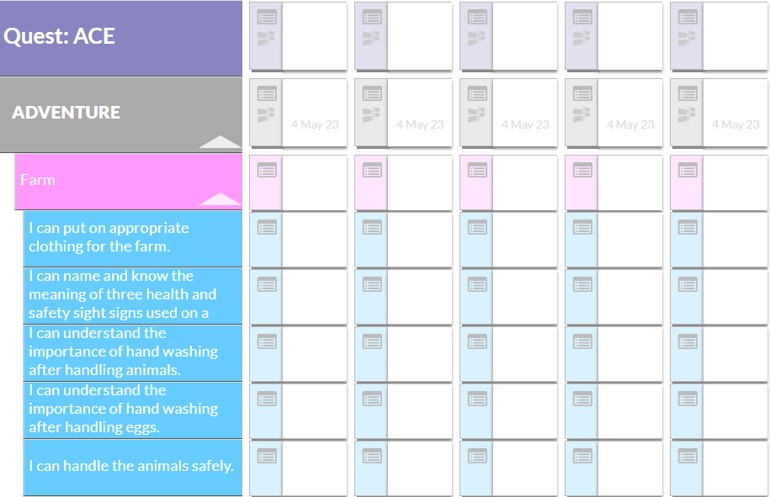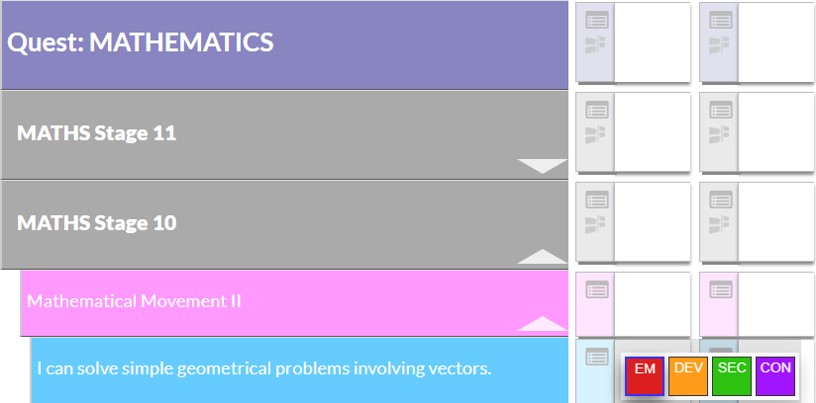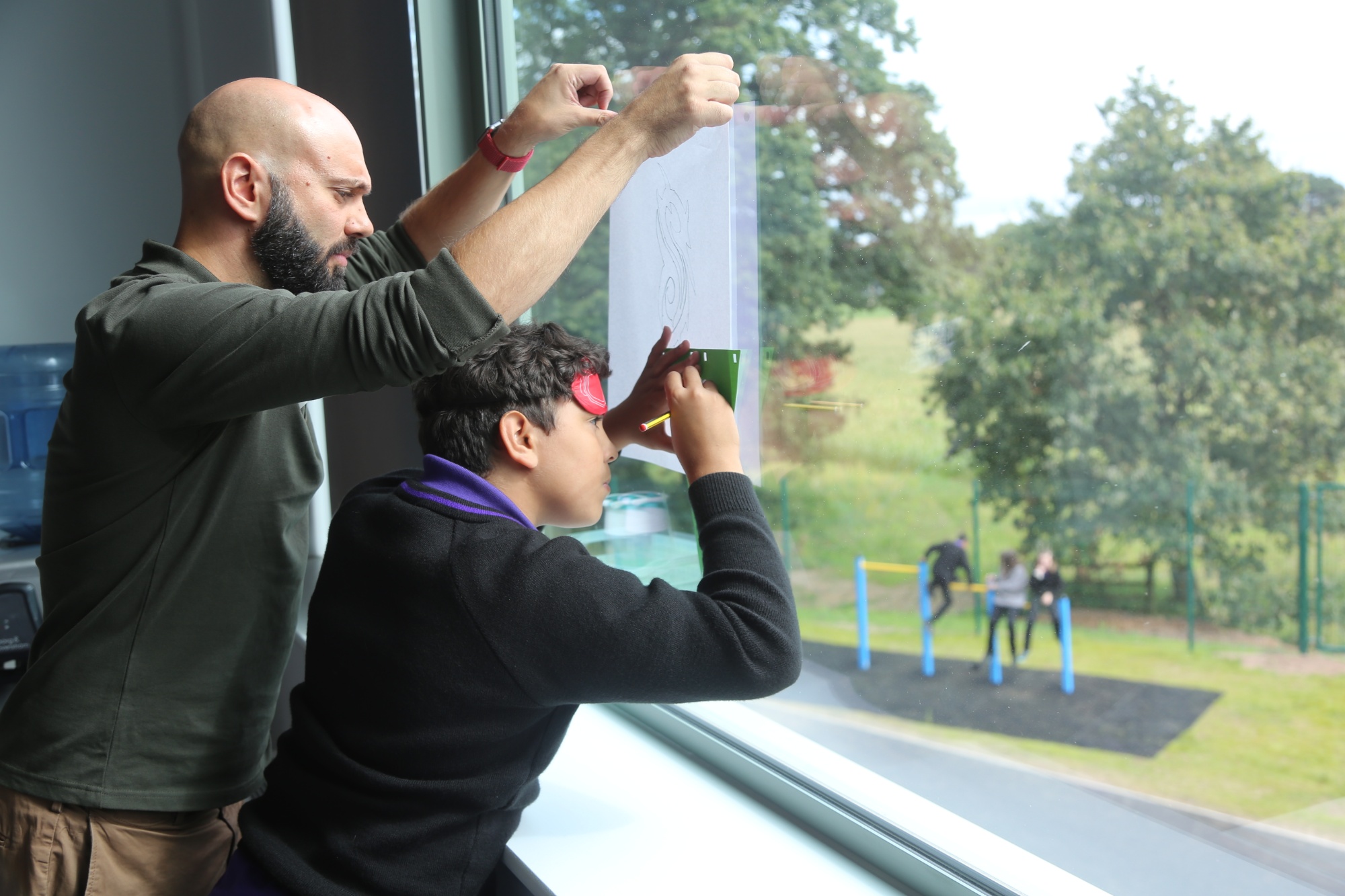Assessment for Learning
Purpose/Rationale
“When used effectively, assessment helps pupils to embed knowledge and use it fluently, and assists teachers in producing clear next steps for pupils.”
(School Inspection Handbook, paragraph 338)
Through our assessment procedures, teachers:
- Systematically assess learners' understanding of what has been taught.
- Identify learner’s misconceptions and adapt teaching to correct these.
- Support learners to embed their knowledge and use this effectively across a range of contexts.
- Identify next steps for learners to develop their knowledge further.
1. Earwig Assessment System
All assessment data will be recorded onto Earwig, an innovative online system designed to capture evidence, record attainment, and assess, track and report progress.
Each area of Quest's bespoke curriculum can be integrated in to Earwig frameworks to be assessed against. This allows staff to evidence and assess progress against 'I can' statements directly related to what is being delivered in individual lessons, and across sequences of learning, as opposed to against high level outcomes derived from the National Curriculum.

Earwig is highly customisable meaning that it is flexible and can be easily adapted to align with the school's dynamic curriculum, which needs to continually evolve to remain ambitious and learner centred.
Learner's attainment against learning objectives is assessed each lesson, with this data being quick and easy to record on Earwig as and when this can be done. 'Data Drops' are taken termly, to allow for in depth data analysis to support teachers in determining next steps to inform their planning.
Using the Earwig application, it is quick and simple to upload photographic evidence against an assessment to support the assessment grade that has been given against the statement.
Assessment Grades
 Whilst some frameworks have unique grading descriptors to align with individual qualification specifications, the majority of frameworks are assessed using the following 'levels of mastery':
Whilst some frameworks have unique grading descriptors to align with individual qualification specifications, the majority of frameworks are assessed using the following 'levels of mastery':
Emerging - The learner has been introduced to a skill/concept but requires a high level of support to understand/use this effectively.
Developing – The learner has developed some understanding of the skills/concepts but still needs support to use this in practice.
Securing- The learner understands the skill/concept and needs less structure and support to use this. However, the learner's ability to apply the skill/concept to other contexts remains limited
Consolidating- The learner is consolidating the skill/concept and can now apply this with a relatively high level of independence to a range of contexts.
2. Data Analysis
Intent:
Earwig has enabled the leadership team to streamline assessment and data practices for staff to reduce workload so that teachers have more time to invest in quality planning and teaching for the learners. This system will also be used to improve reporting procedures to ensure that parents and the learners know how they are doing in school and where they can improve.
Earwig assessment data also enables staff to see how well learners are developing in the areas of curriculum they are studying. Over time, this will build a picture of learners' skills and understanding across the curriculum. This data can also be analysed in the context of the individual learner to identify next steps for their learning. Furthermore, groups which are making below expected progress can be identified quickly so that additional support can be targeted in these areas.
Implementation:
In order to ensure that assessment data is valid, it is important that the skills and concepts that learners are assessed against reflect the unique curriculum that Quest employs to meet the needs of it's learners and to support them to realise their full potential. As such, each area of the Quest curriculum will have it's own custom-built framework based on the skills and concepts that they teach.
Each lesson at Quest begins with a learning objective taken from the relevant assessment framework. Throughout the lesson staff will assess learners' level of mastery against this objective, and can update this on the assessment system as soon as is convenient. This can then be supported with a range of photos taken during the lesson using the class iPad. Teacher meetings will be used throughout each term to carry out moderation to ensure that assessment entries are consistently graded.
At the end of each term, the school lead for assessment will run a data drop and analyse the learners' progress in all areas on the curriculum. A teacher meeting at the end of the term will then be dedicated to discussing points of interest in the data and determining next steps to ensure that learners are supported to achieve best outcomes.
Impact:
To ensure ambitious and realistic targets for progress:
Phase 1
- During the Transition process and upon arrival at Quest, learners will be assessed for a period of two terms to provide a Baseline Assessment. This baseline can then be entered it to Earwig which will store this score for comparative purposes in future analyses whilst Earwig is still building a picture of the learners' total knowledge and skills.
Phase 2
- Once a learner has been at Quest for a period of one whole academic year, Earwig will store the score for a learner achieved in all curriculum areas during the previous academic year. This score is referred to as the Last Year score. This allows a learners' attainment in a given academic year to be compared to that of previous years.
Phase 3
- Once learners have a Last Year score stored in the Earwig database, their teachers will be asked to assign them a Year End Expectation score. This will act as a target for the learner, and can be set individually for each learner and in each subject. This ensures that each learner has their own progress rate for each individual subject which they will be measured against. This ensures that progress targets are personalised and meaningful, as opposed to deriving their targets using nationally metrics.
- As the year progresses, Earwig will update learners forecast against this year-end expected score to indicate to staff whether each learner is on track to achieve their target, or whether further support is needed for the learner to meet their year-end expectation.
3. GL Assessments
Whilst we use Earwig to enable us to assess learners' progress and set targets individually and in a meaningful way, these are complimented by the use of GL assessments to give staff an understanding of where learners compare to the national average in key metrics such as reading, spelling and mathematics.
The Progress Test Series (PT Series) assesses learners’ true comprehension of the core curriculum subjects, helping to identify which learners need extra support and which will rise to more challenging targets. Using the insights from PT Series reports, we can be confident that the targets and interventions set are matched to each child’s attainment, as well as making comparisons with national expectations.
Learners take GL assessments at the start and end of each school year and the results are used in Data Team meetings to set and monitor the impact of individual interventions. These assessments have been standardised on 100,000 children and as such provide accurate data to support teachers in pitching work at the right level for each learner. These assessments also allow staff to measure the progress of learners in the key metrics between any two assessment points.

